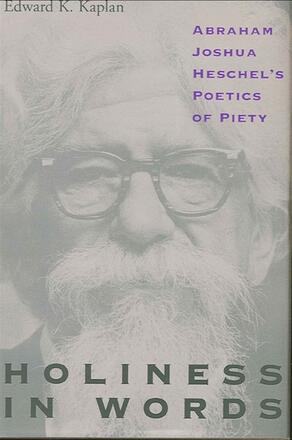
Holiness in Words
Abraham Joshua Heschel's Poetics of Piety
Alternative formats available from:
A strategy for reading Heschel's major works, as well as a new route to understanding religious writing in general: a lucid study of modern religious and ethical thought using literary criticism.
Description
Holiness in Words: Abraham Joshua Heschel's Poetics of Piety is both an introduction to reading Heschel's works in English, and an in-depth study of the way his literary style can transform the consciousness of readers. Heschel's life and works respond to the contemporary crisis in religion, formulating positions on faith and despair, racism and social justice, the Holocaust, interreligious dialogue, and the availability of God's presence. We study Heschel's theory and use of literary language, his "poetics of piety," in order to elucidate his narrative strategy to teach God-centered (or prophetic) thinking.
The book traces the major themes of his "depth theology," awe and radical amazement, the meaning of symbol, ritual, prayer, and mystical insight. Historical and biographical information clarifies Heschel's implicit polemic with Martin Buber and a supplemental study guide provides sources for each chapter and suggestions for further thought and discussion.
Edward K. Kaplan is Professor of French and Comparative Literature and Research Associate at the Tauber Institute for the Study of European Jewry at Brandeis University. In addition to books on the French writers Jules Michelet and Charles Baudelaire, he has published extensively on Abraham Joshua Heschel, Thomas Merton, and Howard Thurman.
Reviews
"A brilliant, and at the same time, moving, and deeply personal interpretation of the works of one of the greatest religious thinkers of this century. By skillfully analyzing Heschel's rhetoric and mastery of language—his 'poetics of faith'—Edward Kaplan acts as a guide to Heschel's writings for the specialist as well as the general reader, for Jew as well as non-Jew. Holiness in Words enables us to see that what Heschel wrote of scripture applies to his own works: '. ..the words became a live wire charged with His spirit. '" — Eva Fleischner, Professor Emerita, Montclair State University
"Once again—and in a new way—the theological and moral nuances of Heschel's spiritual passion can be heard. Kaplan has set our ear to sounds long-forgotten or never known. His work is no deposit of academic travail, but exemplifies scholarship as service in the highest sense.
"A lifetime of listening has gone into the making of this book. Over many years, Edward Kaplan has contributed careful and perceptive studies on Heschel's poetic rhetoric, on his understanding of prophecy and prophetic consciousness, and on the moral life and its relationship to mysticism and transcendence. They are now put to the service of a full-scale exposition of Heschel's thought and spiritual orientation. " — From the Foreword by Michael Fishbane
"This work is an unusually poignant and unique study of understanding modern religious thought using literary criticism. Unrelated to this observation, but of equal significance, is the author's important presentation of Heschel's response to the Holocaust. Also important is his linkage between Heschel's theology—particularly his views of prophecy, and his biography—especially his involvement in social action. While other writers on Heschel have touched on these issues, no other author has done it with such depth or with such clarity. The focus upon the aesthetic features of Heschel's work makes this work unique and significant. The delineation of Heschel's 'sacred humanism' is very well done and could serve as a model for dealing with similar thinkers, e. g., Thomas Merton. " — Byron L. Sherwin, Spertus Institute of Jewish Studies